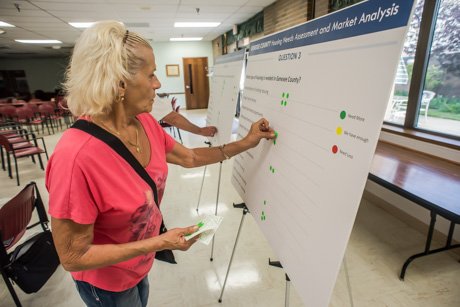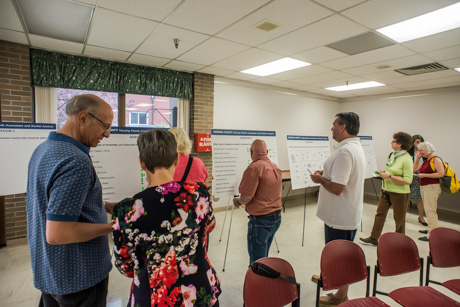
It takes good data to make good decisions and a lot of times when planners are considering housing projects, the developers with the proposals are the ones who have all the data.
A new housing needs assessment for Genesee County will help solve that problem, said Felipe Oltramari, the county's planning director.
"(Developers) are not going to come into a market where they know there is no need," Oltramari said. "They did their own study, but it's a private study that is focused on their segment of the market."
As part of the needs assessment process, the county hosted an open house at the Senior Center on Bank Street last night, which gave the residents who attended an opportunity to provide feedback on what they see as local housing issues, whether it's too much stock in one place, or of one type, or not enough of something.
Oltramari said the comprehensive study will also use interviews with various stakeholders in the community, whether they be veterans' groups, groups that serve seniors, the disabled and business groups. Officials and consultants will also try to identify the housing needs of Millennials. The goal is to get a broad picture of what is needed, which will help guide planning decisions and maybe uncover undetected needs.
"When a study like this happens, you will be able to put that information out there for some developers who may not be looking at this area," Oltramari said
The study is expected to be completed by December.
Oftentimes developers look at census, sales data and current housing patterns to identify a need in a community -- that same data will be gathered for the county's assessment -- and then try to fit a project into that community. But in a small community such as Genesee County, there are potentially niche needs that private developers won't uncover on their own. The county's housing needs study could identify a potential need and make that information available to developers who might decide trying to fill that need could be profitable.
"We want to make sure we’re looking at all segments of the market," Oltramari said. "One thing we heard, especially when Muller Quaker came, there was no housing for executives and lot of them ended up living outside of the county. When STAMP comes, we want to make sure the same thing doesn't happen."
The county's own study will also be used to confirm, or not, what private developers say is a local need. For example, when DePaul Properties was still pursuing a $25 million project on East Main Street in the City, CEO Mark Fuller said DePaul had identified needs in the city for more housing for disabled people, seniors with diminished mobility and veterans. Asked where those people are now, Fuller said they are most likely living with parents or in substandard housing.
That could be an example of a market need that isn't readily apparent to most observers, but solid data could help identify.
(The project was stymied by a City Council decision not to change the zoning of the property from industrial to commercial.)
"They (developers, such as DePaul) know that and they might do their own research and come to that conclusion, but we haven’t seen that research," Oltramari said. "I’m sure there is probably that need, because they have a business model and they have to make sure the project is going to work, so there is some evidence, you have to trust that. But it’s nice to really have the tool to show 'yes, there is that need and this is something we should support as a community.' "




"One thing we heard,
"One thing we heard, especially when Muller Quaker came, there was no housing for executives and lot of them ended up living outside of the county."
I'm trying to figure out what that suggests.
Does it mean some developers missed out on building a tract (or, two) of half-million to multi-million dollar homes? Possibly. ● Oh, yeah, don't forget that, had some "risk-taking" developer decided to build a tract or two of high-priced housing, GCEDC, or, some other quasi-gov't scheme, (most likely) would have expected the taxpayers to chip in on financial incentives to entice the developers.●
And, 3-4 years later, when Muller Quaker closed, who was going to be buying the glut of high-priced housing left behind by the fleeing executives? Employees from the second McDonald's and Dunkin' Donuts?
And yet the City of Batavia
And yet the City of Batavia just turned away, a housing project offered by DePaul... ???
Brian, the DePaul project
Brian, the DePaul project would be a low income project, publically financed with IDA tax breaks for 30 years. It would not be the middle to higher end housing the Quaker Muller executives might have looked for here. And there are about 100 other new apartments planned for the City.
John, I don't see where Brian
John, I don't see where Brian mentioned executive housing.
Also, you left out the part where DePaul would have been paying more in taxes than required under state law and that it would have been a payment four times higher than the current taxes on the property, plus sewer and water fees.
The PILOT payments are not
The PILOT payments are not written in stone. They could be reduced or eliminated if things change. I do not think we need a publically financed low income housing project in Batavia. Clearly, some do.
No, they're just written in a
No, they're just written in a contract.
John, where's your data to show there is no need?
Howard, I said I don't think
Howard, I said I don't think we need a low income housing project that is funded with tax money. That's just a personal opinion,
As for data, that will be or not be shown, by the County housing study. And we still have a 55 low income unit in the planning
that really sux that there
that really sux that there are not enough mansions for the rich executives. are you now going to ask me the taxpayer to foot some kind of bill so they can live in a nice gated community? maybe we can throw in some landscaping, you know the executives don't mow.